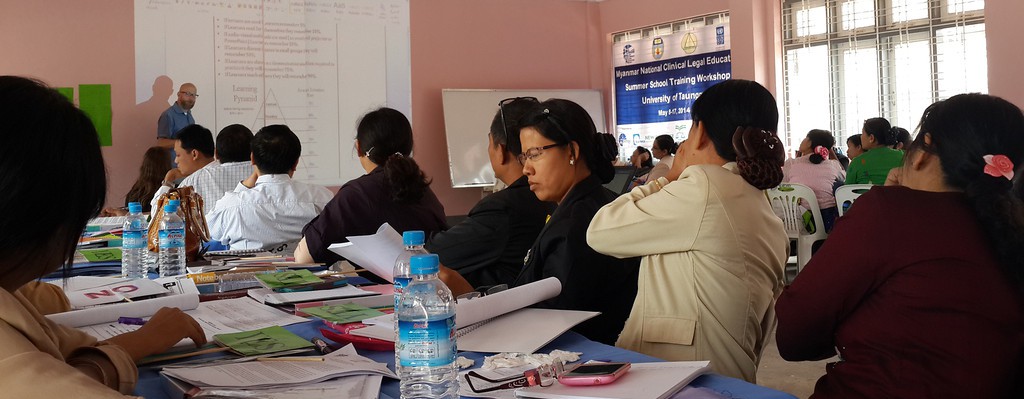For over a year now, the Consortium of Bridges Across Borders South East Asia Community Legal Education Initiative (BABSEACLE), Herbert Smith Freehills and DLA Piper/New Perimeter, have been working to support the efforts of universities in Myanmar in establishing clinical legal education (CLE) programmes. In order to record this groundbreaking journey, the Consortium is producing a documentary film. This “Final Knowledge Product” will feature the innovative ways the programme has worked with 18 Myanmar universities in founding CLE programmes which accomplish six core goals: 1) establishing a structured and skills-building educational opportunity, 2) providing access to justice for local communities, 3) fostering a pro bono spirit in the legal profession, 4) creating closer links between the bar and the academy, 5) engaging students with interactive and reflective teaching methods, and 6) strengthening civil society itself.
The Consortium’s documentary film will essentially be a “how-to” guide for government agencies, universities, NGOs, the donor communities and other actors to model how they can establish, strengthen or support CLE programmes. In this way, the Myanmar CLE programme, co-funded and supported by UNDP and USAID, will inspire CLE advocates well into the future and across geographical boundaries.
To create a high quality film, the Consortium has worked collaboratively, involving multiple team members and leveraging unique individual strengths. Hilang Myint Kyaw (Dang) has filmed numerous events, such as National CLE Summer Schools in 2014 and 2015, the signing of Memorandums of Understanding (MOUs) and interviews with individual teachers, professor heads (often referred to as Deans in many other countries), and law students. Supporting Dang in capturing the film footage are numerous international and Myanmar-based team members.
Sophie Geoghegan, BABSEACLE International Fellow and Michelle Yockelson, BABSEACLE Intern, and myself designed a storyboard to identify the key events and individuals who can provide the most relevant information about how the programme came together, its achievements and goals for the future. We received helpful feedback from the Programme Management Team. The BABSEACLE team then drafted schedules of interview questions for the specific individuals identified in the storyboard.
For example, some of the questions that will be asked of various professor heads at upcoming CLE events are:
- In your own words, can you describe what Clinical Legal Education (CLE) means to you? How do you think it differs from other kinds of legal education?
- Has learning about CLE changed your understanding of purpose of legal education? How?
- Describe the CLE programme at your university.
- What CLE programme activities has your law department implemented?
- What are law teachers doing differently in the CLE programme, when compared with your other law classes?
- Has the CLE programme helped Law teachers understand the legal needs of marginalised communities in Myanmar?
These questions were then translated into Myanmar language by Hsar Moo Paw, BABSEACLE Legal Trainer, and Nwe Mar, BABSEACLE Myanmar National Programme Coordinator.
At the 2nd Myanmar CLE Summer School, held in Taungoo, Myanmar from May 11-15, 2015, Dang captured video of the training sessions and interviews with participants, trainers and U Tin Win, Speaker of Bago Region, who delivered the Summer School opening address. At the Asia CLE Summer School, held in Chiang Mai, Thailand from June 5-14, Dr. Chris Walsh, BABSEACLE Co-Director, conducted media mini-lessons lessons on interviewing and recording techniques with several members of the BABSEACLE team. Dr. Chris demonstrated techniques to ensure interviewees looked good on film. This included mini-lessons on lighting, what to wear (pastels), sound and camera angle. Important features of these mini-lessons where then authored into a film interviewer checklist that will be of particular importance to Hsar Moo and Laphai Nang Doi, BABSEACLE Assistant Legal Trainer, who will be assisting Dang by asking questions while Dang, as director, films numerous interviews in Myanmar over the coming year.
With team members from various countries working in close collaboration, the Final Knowledge Product—or documentary film—for the Myanmar CLE programme is sure to capture the essence of what has made the programme so successful to date, and will be a powerful resource that others can draw upon for years to come.
By Maxwell Abbott_CLE/Legal Support Officer, BABSEACLE

